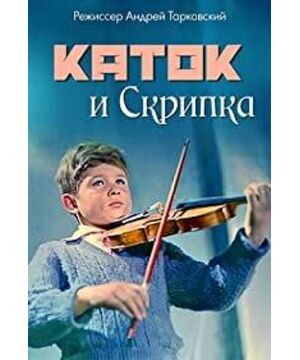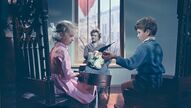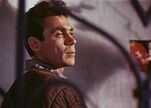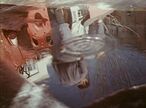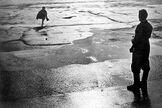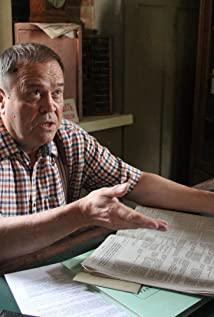The style of things I like is rough or sharp. The former is like sandpaper polished in the heart area, which is dull and continuous pain; the latter is like the two nails in the Passion of the Christ, which can turn blood and bones at once.
So at first glance Tarkovsky felt very fresh and timeless. Especially this "Road Roller and Violin", the director's debut, is also the work of the master when he graduated from the Moscow Film Academy. It only lasts for more than 40 minutes. Compared with the later work, the plot is quite simple: there are not too many symbols and beliefs. It just tells the story of the friendship between a seven-year-old violin boy from a wealthy family and a young road roller. Many people think that the master's work must be difficult and obscure, so they retreat, but most of them are not. Especially this rather simple work, the overall color is warm, every detail of the actor’s expression is quite in place, the technique is very delicate, the use of multiple mirrors to show the details of passers-by movements, etc., makes people feel physically and mentally happy and emotionally complete. Be transferred. This is the charm of images.
It's just that I want to say something off topic outside of the movie.
In the Soviet Union in 1960, proletarian status was an honor.
As soon as the boy Sasha went out of the house, he saw that he was different from the other children: others kicked the shuttlecock to chase and slap, while he hid the violin in the shadow of the corridor, and dared to go out blatantly when an adult came down. Even so, other children will still be regarded as aliens attacked by the group. Originally from the beginning of a person, he has already rejected people or things that are not the same as himself. Sasha's age, I am afraid that because of his uniqueness, he will have inferiority complex. No friend feels lonely and excluded, and is extra cautious; he needs friends, especially those who seem "normal" in his life circle, that is, the proletarian friends of mainstream members of society. And this is basically impossible among children.
He went to take the violin exam, and the little boy in the front line and his mother looked very well-dressed. The beautiful little girl sitting next to her didn't come to take the exam. She admired the music but didn't have the opportunity to learn, so she had to sit outside the door to listen and worship. Music art is the so-called taste of beauty that separates these two classes-art is the youngest and most favored brother in the genealogy of human social productivity.
When the girl saw Sasha holding a musical instrument, she smiled shyly. What's interesting is that, in my opinion, this is not a reaction to mutual affection between adult men and women, but a paradox of art over class transcendence. The apples that Sachasai gave to girls symbolized the encouragement of artistic pursuits and the understanding and forgiveness of class transcendence: that era was similar to China's planned economy period, and only the wealthy class could afford apples. For children, it was difficult to resist. of. And class dignity is also expressed in the place where the girl puts the core back on the chair where Sasha sat after eating the apple—accepting gifts, but not out of original intentions.
Sasha's poor performance in the exam has a lot to do with his inferiority complex caused by being different and no one agrees with him. It wasn't until later that he made friends with the road roller (the name is very difficult to translate, I don't understand Russian, omitted), that his performance really returned to freedom in spirit.
Boys are instinctively fond of machinery. So Sasha, who made friends with the road rollers, gained the envy and jealousy of other children. Even when Sasha drove the road roller, an older child was cooler with him on a bicycle. The result is obvious: Sasha has regained his pride among children. The friendship from the road rollers played a decisive role. He is no longer the little pitiful who hides from other children, and he can even draw his sword to help when he sees injustice!
When colleagues of the road roller praised him as a good worker, and the road roller inadvertently but resisted to say "he is not a working class", Sasha threw the bread he was holding on the ground and was wasted again. The reprimand of grain picked up the bread. He didn't want to lose this friendship. The two ate hard bread together and drank bottled milk on the construction site. Afterwards, Sasha played to the extreme, and it was impossible to tell that this was the work of a child who was only seven years old and had only learned the piano for two years. Music is the universal language of the world, and road rollers are no exception to be inspired. Sasha was recognized and very happy. Ask the road workers to go to the movie "Chabayev" in the evening.
But when he got home, his mother would not let him go out to meet people of unknown origin. This was the guard of the wealthy class only. After waiting hard, the road roller met the girl who had been secretly in love with him pretending to have met (just changed the mud-stained high heels), and the two went to watch the movie together.
Before entering the door, the road roller was still looking back frequently, waiting for Sasha to appear.
At the end. During the day, Sasha did not hold the violin, caught up with the road roller, and disappeared into the screen. Behind is a group of pigeons (the desire for freedom) and the black pitch (the helpless reality?).
I can see from it the fraternity of people for art, and the kindness and forgiveness that radiates based on it. I would like to believe that the limitations of the environment cannot confine people's hearts.
Perhaps this article of mine is just taking it for granted, but it is precisely because of these extensions and reflections of future generations that the master can glow with lasting and eternal charm.
View more about The Steamroller and the Violin reviews


